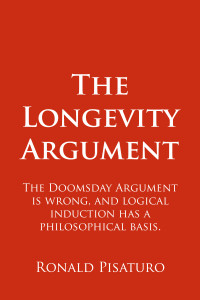I recently Googled myself on Google Scholar, and I learned that my 2009 article, “Past Longevity as Evidence for the Future,” published in Philosophy of Science, has been cited favorably by three different philosophers in four of the top twenty ranked journals of philosophy: Journal of Philosophy (ranked #3), Analysis (#8), Synthese (#10), and Ratio (#18). (Rankings are by Leiter Reports in 2015.)
The article in Ratio, which is recent, also favorably cited my self-published monograph that is a much-revised and much-expanded version of my 2009 article. Therefore, I have decided to offer that 90-page monograph on Amazon in paperback:
The monograph has two elements: a refutation of a wrong argument (the Doomsday Argument), and an introduction to a positive argument for logical induction. The disappointing aspect of all the favorable citations is that they are almost entirely about my refutation. There is only one oblique reference to my positive argument.
In order to get more interest in my positive work in the future, I will heed some of the advice implicit in my previous blog entry. I will submit future work to journals and institutions with more of a Judeo-Christian and Aristotelian foundation.
The book is technical mathematically, because it refutes a technical, mathematical argument. For some less technical background, see here.
Here is a summary of the book:
The Doomsday Argument, Self-Sampling Assumption, and Self-Indication Assumption are wrong; J. Richard Gott III’s delta t argument underestimates longevity, providing lower bounds on probabilities of longevity, and is equivalent to Laplace’s Rule of Succession; but Non-Parametric Predictive Inference based on the work of Bruce M. Hill and Frank P.A. Coolen is consistent with a plausible theory of induction; and Ayn Rand’s identification of characteristics as ranges of measurement establishes a philosophical foundation for such a theory of induction.
Here is the Table of Contents:
Acknowledgments
Abstract
Preface
1. Introduction
2. Doom Soon vs. Doom Late
3. The past as evidence for the future
4. Confusion between future duration and total duration
5. Bayesian analysis of future duration based on past duration
6. Where the Doomsday Argument goes wrong
7. Gott’s delta t formula revisited
8. Time as a valid reference class
9. Conclusion: A calculus for induction
References
Index of Persons
